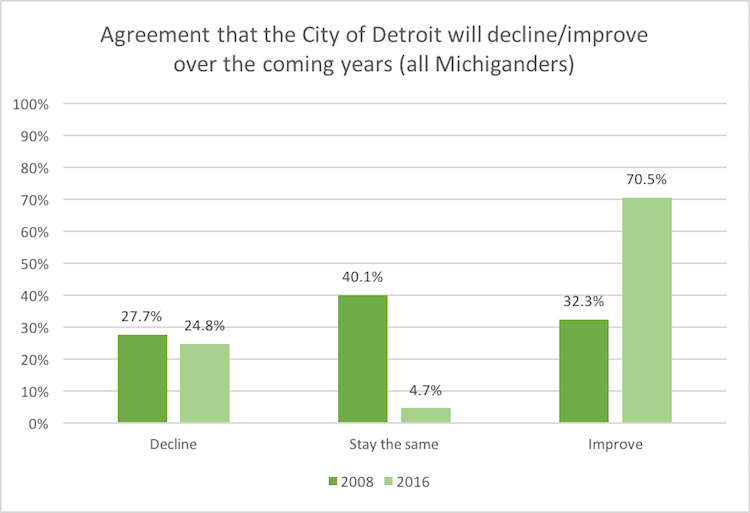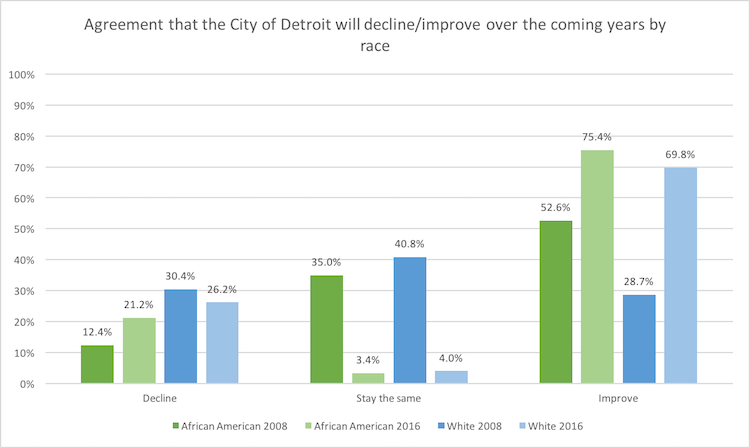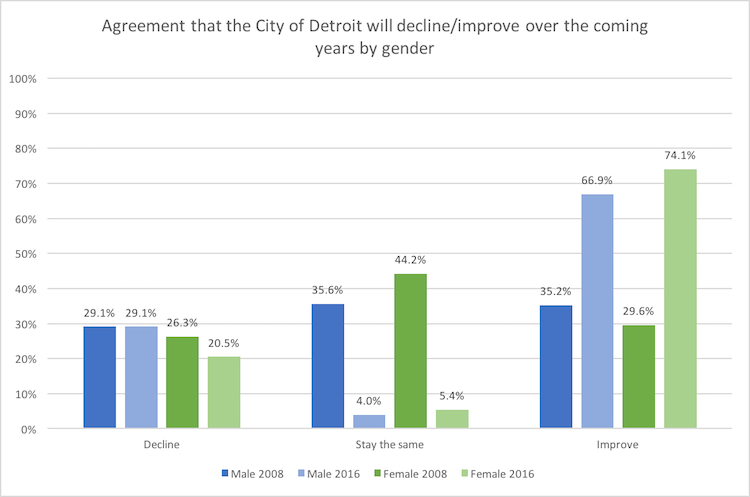Conversations about the prospects for Detroit’s future often expose a divide between those who see the city recovering from a decline in population and financial vitality and those who have given up on the city’s recovery. As part of a research project on the role of the Internet and new media in the development of Detroit, the Quello Center surveyed a random sample of Michigan residents about their perspectives on the future of Detroit.[1] Conducted as part of MSU’s State of the State Survey (SOSS), the sample included nearly 1,000 respondents.[2] Each respondent was interviewed over the phone through random sampling of mobile and fixed-line phones in Michigan.[3]
The results show a divided public, but one in which positive views on the prospects for Detroit far outweigh more pessimistic viewpoints. We asked respondents: “Do you believe that the City of Detroit will decline or improve over the coming years?” More than 7 of every 10 respondents expected the city to improve in the coming years (Figure 1). Just under a quarter of respondents (24.8%) said that they expected the city to decline. Only a small proportion (4.7%) thought the city would stay about the same as today.
Moreover, Michigan residents are more positive about the future of Detroit in 2016 than in 2008, five years before the city of Detroit became the largest municipality in the United States to file for bankruptcy on July 18, 2013.[4] In 2008, there was a more equal split among Michiganders, with 27.7% expecting the city to decline, and a slightly larger proportion (32.3%) expecting it to improve. Fully forty percent (40.1%) expected the city to stay in the same situation in 2008, compared to less than 5 percent in 2016.[5] The drop in those expecting things to change might have declined due to a change in response categories, but opinion has clearly shifted to a more positive outlook for Detroit in the post-bankruptcy environment.[6]
Figure 1. Michiganders Optimistic About the City of Detroit’s Future (2008: N=990, 2016: N=995)

However, not all Michganders are alike in their views. Those who are more positive are more likely to be African-American, female, have incomes above $30,000 per year, and live inside the city of Detroit. Detroit residents were more positive in both 2008 and 2016, but race and gender differences were particularly marked and changed overtime.
Figure 2 shows that in 2008, African American respondents were far more optimistic about the future of Detroit than were white respondents. For example, in 2008, 52% of African American respondents thought the city would improve, compared to only 28.7% of white respondents (Figure 2). From 2008 to 2016, there has been a dramatic increase in the proportion of more optimistic African American (52.6-75.4%) respondents, as well as white respondents (28.7-69.8%), leaving racial divides in attitudes about the city’s future less pronounced in 2016 than in 2008.
Figure 2. Narrowing Racial Divides in Beliefs About Detroit’s Prospects

African American 2008: N=137; African American 2016: N=118; White 2008: N=835; White 2016: N=772
With respect to gender, Figure 3 shows that more women were pessimistic than men (29.6% of women thought things would improve, compared to 35.2% of men), and proportionately more women were likely to believe things would stay the same (44.2% of women, compared to 35.6% of men). However, by 2016, this had reversed, with 74.1 percent of women believing things would improve for Detroit, as compared with 66.9 percent of men. More men and women were optimistic in 2016, but the gain among women surpassed that among men (Figure 3).
Figure 3. Women Become More Optimistic Than Men About Detroit’s Future.

Men 2008: N=477; Men 2016: N=477; Women 2008: N=514; Women 2016: N=479
It is difficult to anticipate the consequences of this shift in opinion. It is possible that a more positive outlook within the population—especially within Detroit itself—will contribute to supporting a growing number of initiatives underway in the central city and neighborhoods of Detroit, ranging from tech startups and urban farming to programs for vulnerable residents in distressed areas of the city.
The Quello Center will continue to follow shifting opinion as it studies the role of the Internet in networking collaborative efforts and opening access to information to its residents in order to support urban development and citizen engagement.
Contact:
Dr Bibi Reisdorf or Professor Bill Dutton at the Quello Center at Quello@msu.edu
Notes
The State of the State Survey (SOSS) is organized and directed by the Institute for Public Policy and Social Research (IPPSR) at Michigan State University. See: http://ippsr.msu.edu/survey-research/state-state-survey-soss
Information about the ICT4Detroit Project of the Quello Center is available at: http://quello.msu.edu/research/ict4detroit-the-role-of-ict-in-collaborat...
[1] This study is the entitled ICT4Detroit. More information is available at: http://quello.msu.edu/research/ict4detroit-the-role-of-ict-in-collaborat...
[2] The Quello Center thanks the Michigan Applied Public Policy Research (MAPPR) program for their support of this survey (Grant GS100213).
[3] This survey was conducted by phone during the period of February and March 2016. Out of the 11,585 numbers called 55.9% of phone numbers worked (N=6,476), and the survey yielded 995 valid respondents, with a response rate estimated at 15.4%, which is considered better than average for similar telephone surveys in the academic field.
[4] The 2008 survey was field during July-September, and asked a similar question: 2008 question, but first presented a number of positive and negative developments occurring in Detroit, before asking: “With these things in mind, do you expect over the next 5 to 10 years that economic and social conditions in Detroit will improve, stay the same, or decline?” Respondents were given three options for their answer: “Improve, Stay the Same, Decline”.
[5] This finding is reinforced by other SOSS results that the vast majority of Michiganders believe that Detroit is ‘much” or “somewhat better off” as a “result of the bankruptcy”. See: http://ippsr.msu.edu/sites/default/files/soss/SOSS72.pdf
[6] The 2016 survey asked: “Generally speaking, do you believe that the city of Detroit will decline or improve in the coming years?” Respondents were given the response categories of “Decline or Improve”. If the respondent indicated an alternative, such as “Both, Mixed, or Will Go Up and Down Over Time”, they were coded as stay the same for purposes of comparison with 2008 results.



